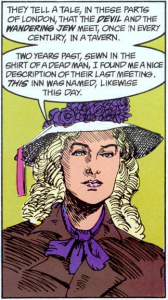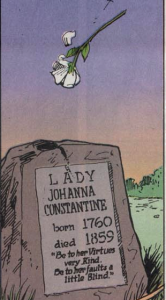Pulp Philosophy
Been a while since I’ve written one of these, and I’ll do my best to keep it to strict philosophy rather than wandering on to a soapbox or talking about how I feel. The title comes from the tombstone of Johanna Constantine in Neil Gaiman’s Sandman and I want to use it to extend the principle of charity a bit.
 The full quote is “Be to her virtues very kind. Be to her faults a little blind.” It’s apt. Johanna Constantine is a spy and con artist who consorts with the supernatural. In short, she’s one of a long line of Constantines in comic books, an ancestor to John Constantine of the Hellblazer series. She’s a small character in a much larger story, and most famously she rescues the head of Orpheus from revolutionary France in the story “Thermidor.” She’s ambitious, ruthless, prideful, vengeful and if she’s anything like her descendant her friends have a terrible habit of winding up dead.
The full quote is “Be to her virtues very kind. Be to her faults a little blind.” It’s apt. Johanna Constantine is a spy and con artist who consorts with the supernatural. In short, she’s one of a long line of Constantines in comic books, an ancestor to John Constantine of the Hellblazer series. She’s a small character in a much larger story, and most famously she rescues the head of Orpheus from revolutionary France in the story “Thermidor.” She’s ambitious, ruthless, prideful, vengeful and if she’s anything like her descendant her friends have a terrible habit of winding up dead.
Be to her virtues very kind
When I first talked about being charitable toward people’s arguments, I talked about how to be kind to their virtues. Put it in the best possible light and extend them every courtesy, because even if their argument is weaker than you make it out to be, you want to make sure you address the strongest version. Putting down a weak argument means there’s still stronger ones to deal with. Start with the strongest, and the weak ones tumble away. This also goes for the people who are making the argument. Never come at the person. Assume they’re smart and wise and treat them accordingly. Even if they make you angry. Especially then, in fact. Let all the other stuff melt away and focus on the claims that they’re making. Ideally you want both of you to come away from it with better justified beliefs about things. It’s less like duelling and more like exploring. You’re not Aaron Burr and Alexander Hamilton (Pro tip: Hamilton didn’t wind up on the US $10 for being a champion duelist), you’re Lewis and Clark. You want to follow your arguments down paths and see where they lead. And when you travel with someone it helps to get along with them.
Be to her faults a little blind
This is just as important. Everyone has made bad arguments and put forward stupid ideas. Everyone. Not just satirically, but in earnest. I once wrote a paper about how it’s important to protect hate speech because it helps us create dialogue and essentially hug it out with haters. My view of the issue was a bit obscured by my giant mountain of privilege, and I didn’t realize about things like the chilling effect such speech has on people’s lives, not to mention that no one is required to justify themselves to haters. Point being one stupid argument or viewpoint doesn’t invalidate a current argument. Even the stupidest person has a sharp day. Even me. So you want to be a little blind to their faults, and expect they’ll be a little blind to yours. The bad idea you had yesterday shouldn’t colour the good idea of today. It’s not enough to say focus on the argument, because sometimes the argument is a part of the problem. If the current discussion rests on a bunch of other problematic arguments the other person has made, consider letting that go and dealing with the matter at hand. A lot of the time if you start digging deeper it can rapidly go from a journey to a rabbit hole. Content yourself with figuring out one thing at a time, and don’t sweat the small stuff.
But only a little blind
 This isn’t to say that who’s making the argument doesn’t matter. I wrote my hate speech paper while reading research on the subject but without any real experience of it. I’ve never been a hater. I went through a bit of bullying in my early years, but I know it’s not the same. I wanted to find people whose bad feelings create bad feelings in others and try to take those away rather than letting them fester. Noble maybe, but it also misunderstood the whole problem because of who I was. I’m also not in a position to write a good paper on black leadership or aboriginal rights and although I think of myself as a feminist I still feel patriarchal when talking about it. In a boring, perfect world we might have clean arguments divorced from all contexts and persons. This isn’t that world. It’s messy and neat and wonderful and our place in it can lead to misunderstandings about class, gender, race, and Star Wars over Star Trek. Be charitable, but don’t let charity keep you from seeing the context. As my good buddy (and by good buddy I mean I shook his hand this one time) John Green says, “Context is everything.”
This isn’t to say that who’s making the argument doesn’t matter. I wrote my hate speech paper while reading research on the subject but without any real experience of it. I’ve never been a hater. I went through a bit of bullying in my early years, but I know it’s not the same. I wanted to find people whose bad feelings create bad feelings in others and try to take those away rather than letting them fester. Noble maybe, but it also misunderstood the whole problem because of who I was. I’m also not in a position to write a good paper on black leadership or aboriginal rights and although I think of myself as a feminist I still feel patriarchal when talking about it. In a boring, perfect world we might have clean arguments divorced from all contexts and persons. This isn’t that world. It’s messy and neat and wonderful and our place in it can lead to misunderstandings about class, gender, race, and Star Wars over Star Trek. Be charitable, but don’t let charity keep you from seeing the context. As my good buddy (and by good buddy I mean I shook his hand this one time) John Green says, “Context is everything.”
